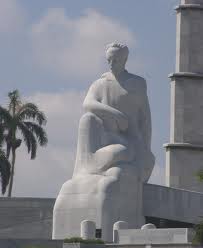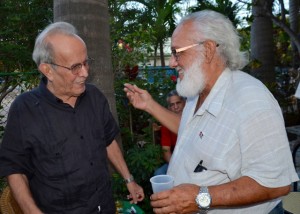An Interview with Gerardo Hernández one of the three Cuban agents
released following the Havana-Washington agreement.
We were subjected a grossly unfair trial
Eduardo Febbro
<http://www.rebelion.org/mostrar.php?tipo=5&id=Eduardo%20Febbro&inicio=0>
Página/12
translated by Sean Joseph Clancy
*If there is a story within the story that might serve as a synopsis
of the bitter history between the U.S. and Cuba, it is that of Cuban
agents condemned to serve sentences in North American jails,
disproportionate to what they had actually done.
A few stops beyond the stairs to a station in North Brussels, where an
elderly orhestra are making an unholy mess of the “Besame Mucho” song,
one of three Cuban intelligence agents released as part of a
settlement partially mediated by the Vatican on the reestablishment of
diplomatic ties.
If there is a story within the story that might serve as a synopsis of
the bitter history between the U.S. and Cuba, it is that of Cuban
agents condemned to serve sentences in North American jails,
disproportionate to what they had actually done.
Gerardo Hernández is one of 5 Cuban intelligence agents who along with
Ramon Lanañino, Fernando Gonzalez Llort, Rene Gonzalez Sehewerert and
Antinio Guerrero Rodriguez who during the mid 1990’s undertook
special missions within the U.S. in order to discover and prevent
terrorist actions, including attacks on hotel and tourist resorts and
sabotage by counter-revolutionary groups planned in Miami and later
carried out in Cuba.
The Five were uncovered and arrested in 1998. Later in what was one of
the longest trials in North American judicial history, the Cubans were
issued sentences which essentially were political punishments
orchestrated by the U.S. administrations obsession with Cuba.
Gerardo Hernandez, accused of “conspiracy to commit murder” was given
two life sentences.
Generally speaking, cases involving unregistered foreign agents
discovered operating in a foreign territory are dealt with behind
closed doors and resolved by negotiation. The case of the Cuban Five
was the polar opposite. Amid espionage and other outrageous
accusations, they were tried by a court in Miami and used as
implements of political manipulation.
Free today, the refreshing intelligence of Gerardo Hernandez reveals
no trace of the 16 years spent in North American penitentiaries, the
abuses suffered nor the long months of detention in rigorously imposed
solitary confinement.
Thanks to interventions by U.S. senator Patrick Leahy, one of those
who has most fervently advocated for the lifting of the U.S. blockade
of Cuba, Hernandez had a son while still in prison.
The senator helped organize for Gerardos wife, Adriana Perez, br
artificially inseminated.
Following 18 months of secret negotiations with Pope Francis as
guarantor, the seemingly impossible dreams of freedom of the three
agents still behind bars in U.S. jails – Antonio, Gerardo and Ramon –
became a reality on the day of the historical declarations, December
17th 2014.
–The theme of the Cuban agents was what had been blocking, but that
also eventually unlocked the key to, negotiations with the U.S.
–Yes, exactly, our case remained very much in the air because of more
than 50 years of adversarial or non-existent relations with the U.S.
which are what led to the politicized nature of the trial of the Cuban
Five and what underpinned the cruel nature of our treatment.
Remember, there was a case a few years ago regarding the arrest of
Russian spies. That was speedily dealt with by negotiation and they
were repatriated without ever having to stand trial.
Our case was complicated by the history of conflict between the U.S.
and Cuba, which is paradoxically what eventually facilitated a
resolution.
For certain, the resolution of our case cannot only be attributed to
the negotiations, because the solidarity we experienced over so many
years was also relevant.
The Five of us had become very well known, there were presidents, and
religious, cultural and political personalities, all calling for our
release.
Ours had become a most embarrassing case for the north Americans. It
had taken a lot of work for us to develop any awareness of our case.
It had been one of the longest in U.S. legal history; lasting 7 months
during which more than 100 witnesses testified. The press however
maintained an amost blanket silence.
Little by little the solidarity work of comrades who took to the
streets protesting became necessary.
–Today we know that the Pope played a leading role in the agreement.
The Vatican was the guarantor of the liberation process. Were you
aware of the Vaticans intervention?
–No, I did not know about it. It came as a surprise because we were
removed from that entire negotiation process. I did not know about the
role played by the Vatican. It was afterwards that I learned about
the parts played by various cardinals, amongst them the Archbishop of
Havana and Cardinal Jaime Ortega, who I hold in high esteem. We are
truly grateful.
We have always accepted the help of all persons of goodwill. It must
be remembered that in addition to the political connotations
surrounding our case that there was a profound human tragedy also
unfolding. I am glad that Pope Francis, being a Latin American was
conscientious.
I can honestly express great admiration for him. He has demonstrated a
very courageous attitudes, worthy of respect. On behalf of the Five
and our families, beneficiaries of this attitude, I send him our
thanks.
–If one examines the terms of negotiation, Cuba did not really concede
anything at all. Washington always maintained that they would never
deal with Cuba in the present political context, but did so
nevertheless.
–My personal opinion is that for a very long time the U.S. held that
line, that as long as there was a Castro in power in Cuba –which is
how they refer to the Revolution with the Cuban people in power – and
that they would also never negotiate with Cuba while the Communist
Party remained in power and the Revolution remained.
All of these conditions still exist and we nevertheless have talked
under the only condition always imposed by Cuba, that the talks are
between equals and absolutely respectful of our independence and
sovereignty.
–Did you at any point feel the weight of history on your shoulders?
The Five were, to a very great extent , the key to the knot
–I never saw the case as being of that magnitude. More towards the
end, when there were rumors of a solution, and especially when our
release was announced I began to feel it somewhat. I did then —
without knowing the extent of the progress — imagine that this might
be the route to further progress. When Raul Castro spoke with our
family members by his side is when I fully realized.
The three released Cubans knew nothing about the talks. We were
informed one day prior to our releases and we learned about the
reestablishment of diplomatic relations through Raul’s speech.
–Your case in an example for the world about the use of the justice
system as a weapon in a conflict with another state.
–Yes, the case of the Five was a revenge attack against the Cuban
Revolution and Cuban Revolutionaries. The U.S. saw an opportunity to
score a point and did so by taking Five men hostage. We accepted that
we had, by possessing false passports and operating as foreign agents
unregistered with the State Department, violated U.S law.
Ok, but we had a legal right to enter a “necessity” defense and to
outline why, but that was not permitted. The trial was held in Miami
where we, in reality, had no rights whatsoever. This was a totally
biased trial.
We were found guilty and given the maximum possible sentences on every
count. They thought that by punishing the Five meant punishing the
Cuban Revolution.
Their initial plan was to have all of us betray Cuba and mount a media
show against the Revolution.
That did not happen and so came 17 months initially — and later many
more — in punishment cells without ever hacing committed and
indiscipline. This is why our wives were denied visits.
–Paradoxically, while you were being condemned , there were people
distributing a very thick manual in Miami.
–Incredible! The US claims to wage war against terrorism. Young North
Americans serve in the Army and die in other countries in the name of
this war on terror. But the terrorists are here!
Luis Posada Carriles remains at liberty to stroll around the Miami
streets despite being responsible for the attack on the Cubana
Airlines plane in 1976 in which 73 people lost their lives and the
bombing of hotels in Havana in which a young Italian man was killed.
He has an long record of terrorism but freely walks the streets.
Carriles and others were trained by the CIA to bring down the Cuban
Revolution. There have been points in history when the CIA had nothing
to do with them, but during these they turned a blind eye to them as
they continued uninhibited to do as they wished.
–Was this the mission you were dispatched to Miami on, to investigate
such groups?
–Yes, to investigate terrorist groups such as Alpha 66, The F4
Commandos, Brothers to the Rescue… and these groups still exist,
still have their training camps there
Cuba had certainly complained many times to the US Government about
the activities of such groups, but they continued to carry on with
impunity, creating the necessity for Cuba to send agents to monitor
and infiltrate them and to send information back to Cuba to prevent
acts of terrorism.
–Have your views on the US or the Revolution changed?
–They have changed in that today my character and my revoltionary
convictions are more solid now, as is my love for the Cuban people.
I lived for 16 years in those jails and that society and during that
time encountered within the prisons a great number of experiences,
human dramas, young people – barely twenty years of age — who might
have been doctors or engineers condemned to life sentences. This is
because there is a system that, from the moment of their birth,
instills in them that they must aquire more, that they should walk
over anyone to get ahead in life and get what they want.
This is absolute brutalization, it is truly a human tragedy. Those
years spent in the US, both on the streets and behind bars have
reaffirmed my conviction that, no matter what problems we may have in
Cuba, we must continue to work to improve our system and our
socialism.
I do not anything like I witnessed in the U.S. for Cuba. But I do not
feel any resentment or bitterness to the U.S. No, I feel compassion
and no hatred for anybody.
–You were also confronted by the great change that the one time great
enemy of Cuba might be transforming, even into a potential ally.
The Cuba of your time in prison is not the Cuba to which you been freed.
–For sure! It would be strange if it were the same Cuba because that
would require a denial of our own we would be denying our own dialect.
I am happy that Cuba has changed and that most of the changes are for
the better.
No revolution can remain static. We are confident that the Cuban
people can confront the challenges posed by this process. They are
significant challenges. There are thise who suggest that they (the
U.S.) will attain by the embrace of a bear what they could not during
more than 50 years of Blockade, aggression and threats….








